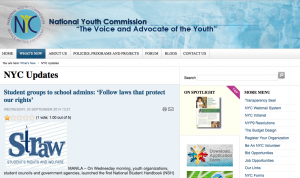First National Student Handbook on rights and welfare launched
MANILA, Philippines — Youth organizations, student councils and government agencies, launched the first National Student Handbook (NSH) that aims to educate students about present safeguards for their rights and welfare.
Through a partnership between the National Anti-Poverty Commission (NAPC) and the National Youth Commission (NYC), the NSH was crafted in consultation with student representatives from different high schools, colleges and universities in the country, both private and public.“This can be one of their primary references in ensuring that their voices are heard and their interests are protected,” said Heart Dino, former student council chairperson of UP Diliman and NAPC Youth and Students Sectoral Council member.
Lacking student representation
In 2012, two female senior students from St. Theresa’s College in Cebu were not allowed to attend the graduation ceremonies despite a regional trial court ruling that allowed them to do so.
This served as their penalty for posting photos of themselves in bikinis on their social media accounts.
Article continues after this advertisementIn addition, not all of 1,636 colleges, universities and technical/vocational education institutions in the Philippines have a functioning student government or council that will ensure that the students’ needs are well represented.
Article continues after this advertisement“This leaves our students highly vulnerable to possible abuses of their rights brought about by policies from school administrators,” remarked NYC chairperson Gio Tingson.
Present legal remedies
As a multi-stakeholder project, the National Student Handbook informs students about the existing legal safeguards which can protect their rights and ensure their well-being.
It features existing guidelines from DepEd, CHED and TESDA regarding common instances of students rights violation such as tuition fee hikes, the “no permit-no exam” policy, disciplinary sanctions, discrimination and basic freedoms of religion and free expression.
The Anti-Hazing Law is also featured in the handbook in light of the numerous cases of fraternity-related violence, claiming the lives and futures of many young college students.
To address sex and gender-based violence (SGBV) and abuses, the Magna Carta of Women guarantees equal opportunities, as well as equal protection for both male and female students against sexual discrimination.
In the Philippines, conservative private educational institutions like Catholic schools continue to ban unmarried pregnant women from continuing their studies.
Student Rights and Welfare
The handbook also discusses the clear provisions of the Students Rights and Welfare bill, which includes a Magna Carta of Student Rights -– a list of the basic rights that the bill seeks to protect.
According to Student Council Alliance of the Philippines (SCAP) NCR Chairperson Maverick Banzon, while the handbook may serve as sound basis for students to assert their rights, it is only “the prelude to a more permanent and formidable safeguard” that a STRAW Act will be able to provide.
“We continue to fight for the passage of the STRAW Bill in Congress but until then, schools must protect students in accordance with the existing laws of our land, regardless of class, culture and creed,” Banzon added.
